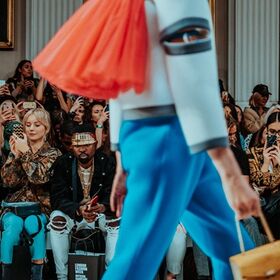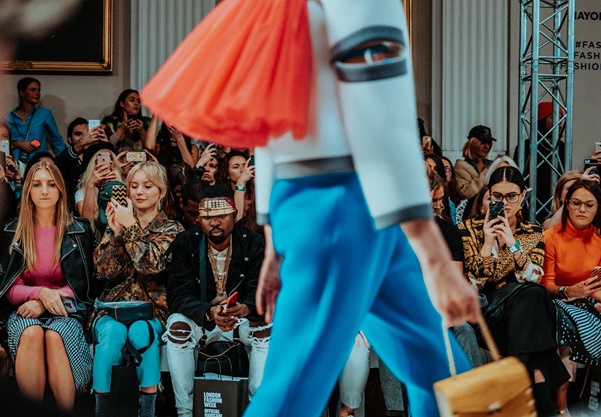Burberry, Gucci and Louis Vuitton
Investment companies discuss their fashion holdings ahead of London Fashion Week.

 As catwalks are constructed and outfits chosen, the capital is preparing to celebrate London Fashion Week. From 14 February global fashion brands will showcase over 250 designers and generate orders worth an estimated £100m.
As catwalks are constructed and outfits chosen, the capital is preparing to celebrate London Fashion Week. From 14 February global fashion brands will showcase over 250 designers and generate orders worth an estimated £100m.
Many of the world’s most iconic brands are fashion brands, and with increasing numbers of wealthy customers in key emerging markets, the long-term prospects for the industry look bright despite current concerns about the coronavirus. How are investment companies approaching this theme and what does a fashion brand add to a portfolio? Ahead of London Fashion Week, the Association of Investment Companies (AIC) has spoken to investment company managers about their holdings in Burberry, Gucci, Louis Vuitton, Next, Moncler and Zara.
Annabel Brodie-Smith, Communications Director of the Association of Investment Companies (AIC), said: “Fashion is a subject close to my heart. Currently, the impact of the coronavirus is very concerning, but emerging markets worldwide present a long-term opportunity. Fashion brands often enjoy remarkable pricing power and customer loyalty. Admittedly, fashions come and go, and what is in vogue today can quickly become old hat. But investment companies, which have stood the test of time for over 150 years, are a good way to back these innovative fashion businesses for the long term.”
Burberry
Nick Train, Portfolio Manager of Finsbury Growth & Income, said: “According to Interbrand’s 2019 survey of the 100 most valuable brands in the world, there are nine luxury fashion brands that make it into that top 100. Burberry is one of them – rated less valuable than Vuitton and Hermes, for instance – but still in that iconic cohort. Meanwhile, there are only five UK brands of any description in Interbrand’s 2019 top 100 – HSBC, Land Rover, Mini, Burberry and Shell.
“It appears, therefore, that Burberry is not only rare from a global point of view, it is extremely rare in the context of the UK economy and stock market. It is, for instance, the only luxury fashion brand in the FTSE 100. Now, being rare is not enough to make any company a great investment, but it’s a useful start. Of course, a Gucci or a Prada are competitors to Burberry, but neither they, nor any other luxury company, has the same heritage as Burberry. And by definition, none of them can claim the same ‘style anglais’ – because Burberry is the only one that can represent that type of Britishness. It’s a style beloved of Asians – meaning that Burberry offers a wonderful participation in the growing wealth of that region over decades to come.
“Some investors worry that Burberry’s business is volatile, because of its luxury and fashion character and it is true that its sales and profits are not as predictable as, say, a toothpaste manufacturer. But it is important to take a longer-term perspective. Since Burberry listed as a public company back in 2002 its shares have risen more than tenfold, despite the ups and downs. We think its best years are still ahead and the shares become a buy on periodic scares about China.”
Kering – owner of Gucci & Yves Saint Laurent
Catharine Flood, Corporate Strategy Director for Scottish Mortgage, said: “Within the luxury brand end of the spectrum, Kering owns a fine collection of globally recognised houses, including Gucci, Balenciaga and Yves Saint Laurent. Yet perhaps more impressive is the group’s leaders’ willingness to embrace the power of creative destruction for long-term growth and development. Kering’s Chairman and CEO, François-Henri Pinault, has long believed that ‘luxury and sustainability are one and the same’ and the adoption and development of new synthetic materials by the group, despite its deep heritage in natural luxury materials such as leather, demonstrates its willingness to innovate as the world changes.
“While many companies try to identify the threats to their existing businesses, far fewer have a culture which enables them to respond to those challenges. The ability to adapt is crucial to ensuring a company’s longevity and value creation. This is why we look for precisely such traits within the companies Scottish Mortgage holds as we seek to own the small group of extraordinary growth companies which drive long-term equity returns.”
LVMH – owner of Louis Vuitton & Christian Dior
Sam Morse, Portfolio Manager of Fidelity European Values, said: “LVMH is the number one luxury goods company in the world. It has an unrivalled portfolio of brands across fashion and leather goods, for example Louis Vuitton and Christian Dior; wines and spirits such as Hennessy and Moët & Chandon; perfumes and cosmetics like Givenchy; and watches and jewellery such as TAG Heuer and Bulgari. It has consistently delivered good cash flow return on investment coupled with strong growth, and it remains extremely well placed to benefit from the ongoing growth in luxury goods driven by emerging middle classes, particularly in China. Its brand equity, scale and diversification also makes it relatively defensive within its peer group if demand slows.”
Moncler
Zehrid Osmani, Portfolio Manager of Martin Currie Global Portfolio, said: “Moncler is a global leader in super premium down jackets with a rich heritage and tradition. We believe that the structural growth potential of the company is compelling, and its ability to innovate is strong. The market, however, seems overly focused on short-term concerns around the slowdown in China and is overlooking the long-term growth opportunity.
“The management has an exemplary track record and is clearly executing its business plan. For example, the CEO and Creative Director are ensuring that the brand remains fresh and that innovation is driving exciting new product ranges which is helping to deliver strong top-line growth. Crucially, Moncler is very protective of their brand and clever management of inventory levels is ensuring that margins remain high.
“Given Moncler’s greenfield growth opportunities and strong creative content, we believe it could achieve a low teens top-line growth, with returns remaining high given the prudent approach to inventories by the management team. We forecast a return on invested capital of around 48% rising to around 58% over our five-year forecast for this company.”
Next
James Goldstone, Manager of Keystone, said: “Once upon a time Next was a store-based retailer that had launched a successful catalogue. Before the internet existed, catalogues were the closest thing to internet retailing and this heritage has enabled the company to evolve into a leading digital multi-brand retail platform and logistics business, combining online and store-based retailing. This is the model for the retailer of the future.
“But the innovation within Next goes beyond logistics – Next is using its digital platform and social media to advertise its products to consumers reaching all age groups. Not only does the company sell its own Next and Lipsy brands but it achieves the same margin selling over 1,000 third-party labels like Armani, Hobbs, Levis and Hugo Boss.
“The shape of the business is markedly different to just four years ago: 51% of sales are now online compared with 39% in 2015. In the 2019 half-year results, 80% of online clothing sales were Next brand, growing at 4% a year, and non-Next brand accounted for 20% growing at 26% per year, a significant transformation by any measure.”
Inditex – owner of Zara & Massimo Dutti
Catharine Flood, Corporate Strategy Director for Scottish Mortgage, said: “Created in 1985 Inditex, owner of Zara, uses an innovative supply chain model to allow it to respond to its customers’ demands in a timely fashion. This contrasts with many of its traditional high street competitors’ more inefficient approach of convincing consumers to buy what they have already produced for a given season. Not only have Inditex’s brands expanded geographically over the years, the group has also embraced the potential e-commerce challenge to its own business. Inditex has developed online stores for its brands as well as selling a selection of their brands through Europe’s largest digital fashion platform, Zalando.”
-Ends-
Follow us on Twitter @AICPRESS
Notes
- The Association of Investment Companies (AIC) was founded in 1932 to represent the interests of the investment trust industry – the oldest form of collective investment. Today, the AIC represents a broad range of closed-ended investment companies, incorporating investment trusts and other closed-ended investment companies and VCTs. The AIC’s members believe that the industry is best served if it is united and speaks with one voice. The AIC’s mission statement is to help members add value for shareholders over the longer term. The AIC has 363 members and the industry has total assets of approximately £202 billion.
- Disclaimer: The information contained in this press release does not constitute investment advice or personal recommendation and it is not an invitation or inducement to engage in investment activity. You should seek independent financial and, if appropriate, legal advice as to the suitability of any investment decision. Past performance is not a guide to future performance. The value of investment company shares, and the income from them, can fall as well as rise. You may not get back the full amount invested and, in some cases, nothing at all.
- To stop receiving AIC press releases, please contact the communications team.

